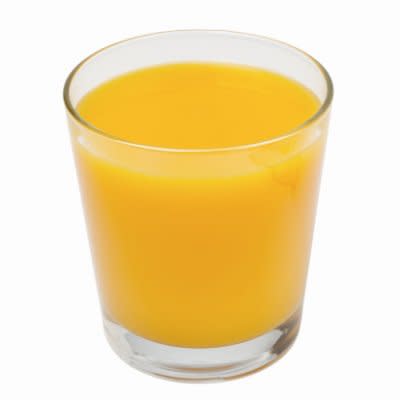Not so sweet: Even "100 percent pure" orange juice is artificially flavored

Ever wonder why commercial orange juice-even the premium, not-from-concentrate, "100-percent pure" juice kind-tastes the same each time you buy it, but doesn't taste exactly like a freshly peeled orange?
Turns out there's a lot more to making juice than simply squeezing some citrus. As part of the mass-production process, big-name brands like Tropicana, Minute Maid, Simply Orange, and Florida's Natural add artificial flavoring in order to make sure your juice tastes consistent from carton to carton-and to make sure it tastes like oranges.
"It really rocks people's world to learn that most orange juice is not a fresh product," says Alisa Hamilton, author of "Squeezed: What You Don't Want to Know About Orange Juice," says in an interview posted on her website.
Pasteurized, not-from-concentrate orange juice takes up a lot of storage space. In order to keep it from spoiling without adding chemical preservatives, the companies "deaerate" (or strip the oxygen out of) the juice. (Another surprise: During production, deaerated juice often sit in million-gallon tanks for as long as a year before it hits supermarket shelves.)
But when they remove the oxygen, they also remove much of the natural flavor of the oranges. "So in order to have OJ actually taste like oranges, drink companies hire flavor and fragrance companies, the same ones that make perfumes for Dior, to create these 'flavor packs' to make juice taste like, well, juice again," Casey Chan explains over at Gizmodo.
Tropicana (owned by PepsiCo), Minute Maid (Coca Cola), Simply Orange (also Coca Cola), and independently owned Florida's Natural all add the flavor packs, Hamilton says.
"The formulas vary to give a brand's trademark taste," she writes in a report. "If you're discerning you may have noticed Minute Maid has a candy like orange flavor. That's largely due to the flavor pack Coca-Cola has chosen for it."
The artificial flavor also varies depending on where the final product is supposed to end up, the report says. "The packs added to juice earmarked for the North American market tend to contain high amounts of ethyl butyrate, a chemical in the fragrance of fresh squeezed orange juice that, juice companies have discovered, Americans favor. Mexicans and Brazilians have a different palate. Flavor packs fabricated for juice geared to these markets therefore highlight different chemicals."
Since the artificial flavor is technically derived from naturally occurring orange essences and oil, it doesn't have to be listed as an ingredient. So what you see is on the label is "100 percent orange juice"-even though that's not all there is inside the carton.
Also on Shine:
